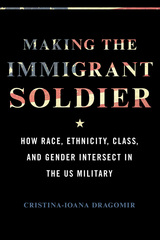

A compelling union of analysis and rich storytelling, Making the Immigrant Soldier traces the complexities of serving in the military in order to pursue the American dream.

Case studies explore how to improve military adaptation and preparedness in peacetime by investigating foreign wars
Preparing for the next war at an unknown date against an undetermined opponent is a difficult undertaking with extremely high stakes. Even the most detailed exercises and wargames do not truly simulate combat and the fog of war. Thus, outside of their own combat, militaries have studied foreign wars as a valuable source of battlefield information. The effectiveness of this learning process, however, has rarely been evaluated across different periods and contexts.
Through a series of in-depth case studies of the US Army, Navy, and Air Force, Brent L. Sterling creates a better understanding of the dynamics of learning from “other people’s wars,” determining what types of knowledge can be gained from foreign wars, identifying common pitfalls, and proposing solutions to maximize the benefits for doctrine, organization, training, and equipment.
Other People’s Wars explores major US efforts involving direct observation missions and post-conflict investigations at key junctures for the US armed forces: the Crimean War (1854–56), Russo-Japanese War (1904–5), Spanish Civil War (1936–39), and Yom Kippur War (1973), which preceded the US Civil War, First and Second World Wars, and major army and air force reforms of the 1970s, respectively. The case studies identify learning pitfalls but also show that initiatives to learn from other nations’ wars can yield significant benefits if the right conditions are met. Sterling puts forth a process that emphasizes comprehensive qualitative learning to foster better military preparedness and adaptability.
READERS
Browse our collection.
PUBLISHERS
See BiblioVault's publisher services.
STUDENT SERVICES
Files for college accessibility offices.
UChicago Accessibility Resources
home | accessibility | search | about | contact us
BiblioVault ® 2001 - 2024
The University of Chicago Press









